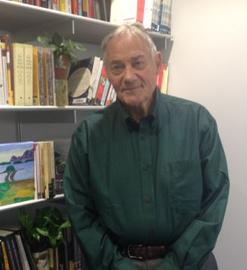 |
|
| Hugh Van Dusen | |
Legendary Harper editor Hugh Van Dusen was there at the dawn of Harper Perennial. He started his publishing career in 1956 as a "boy Friday" to Mel Arnold, the man who started paperbacks at Harper with Harper Torchbooks, which focused on reprints of scholarly books. In 1964, the Perennial Library followed--but only after a major glitch. "Harper had made a deal with Allen Lane, the formidable founder and head of Penguin in England, to distribute their books in the U.S.," Van Dusen said. The company prepared by hiring a sales force of 15, but at the last minute, Lane backed out of the deal. To have something for the sales force to sell, "Harper management decided to start a line on the model of Dolphin Books at Doubleday and Collier Books at Macmillan, both of them started by Leonard Shatzkin," Van Dusen continued.
Harper hired a colleague of Shatzkin, Bob Haynes, to run Perennial and the new sales force. In turn, Haynes hired as editor a former Dolphin editor, Tom McCormack, who, after several years at Harper, went on to a long, successful run at St. Martin's Press.
After its initial list of eight titles, Perennial published as many as 20 books a month that included staples from the Harper backlist, many of which had appeared in mass market editions. Mysteries and other genre fiction rounded the list out. In essence, Van Dusen recalled, "It was a mass market list without mass market distribution--that is, it was restricted to bookstores and did not include the drug stores and other non book outlets that were the meat and potatoes of the true mass market lines."
This caused financial problems that led the management of the company to propose shutting down Perennial, but longtime Harper publisher Cass Canfield Jr., who had started the Colophon Books line in 1962 and was a Harper board member, defended Perennial, and finally the imprint began to grow and become profitable.
In the mid-1980s, Bill Shinker joined Harper as publisher of paperbacks, which now included Perennial, Torchbooks, Colophon and Barnes & Noble Paperbacks (sold to Harper by the bookseller in the days before it became a national chain). Shinker believed that having this many paperback imprints was confusing to stores and readers and that there should be just one name for them all. At a meeting, the paperback staff chose Perennial as the best of the names. "It was a very good decision," Van Dusen recalled.
Early in his career, Van Dusen was an editor in the religious books department, where Torchbooks started, and eventually was the Torchbook editor. Later he joined the trade department as a hardcover editor, working on books that were intended to become Torchbooks--and then Perennial titles.
Among the many authors Van Dusen has worked with, he remembers in particular:
Fernand Braudel, "the leading historian of the 20th century," whose first book in English, The Mediterranean, appeared in 1970.
Howard Zinn, whose A People's History of the United States Van Dusen edited after the acquiring editor left the house. "It is the only book, so far as I know, from any publisher that sells more copies each year than the year before," he said.
Thomas Moore, whose Care of the Soul appeared in 1992, "the most successful book I have edited."
Jacques Barzun, whose From Dawn to Decadence Van Dusen called "a distinguished work of history and immensely readable as well."
In his illustrious career, Van Dusen has seen many changes. Besides the obvious--"when I started there was no air conditioning, no electric typewriters, no Xerox machines, no fax machines," he said--there was no marketing until the '70s. "Books were signed up more often based on the deeply informed hunches of senior editors and almost never by groups," with advice from the sales department.
Of course, there were no computers in the early days. ("All sales records were handwritten by a crew of perhaps eight women on the second floor on 33rd Street on stiff cardboard cards about eight inches by three inches.") As a result, as John Farrar, co-founder of Farrar, Straus & Giroux, told Van Dusen when he was first looking for a job in the business, "You know, Hugh, publishing is all about memory!!"

